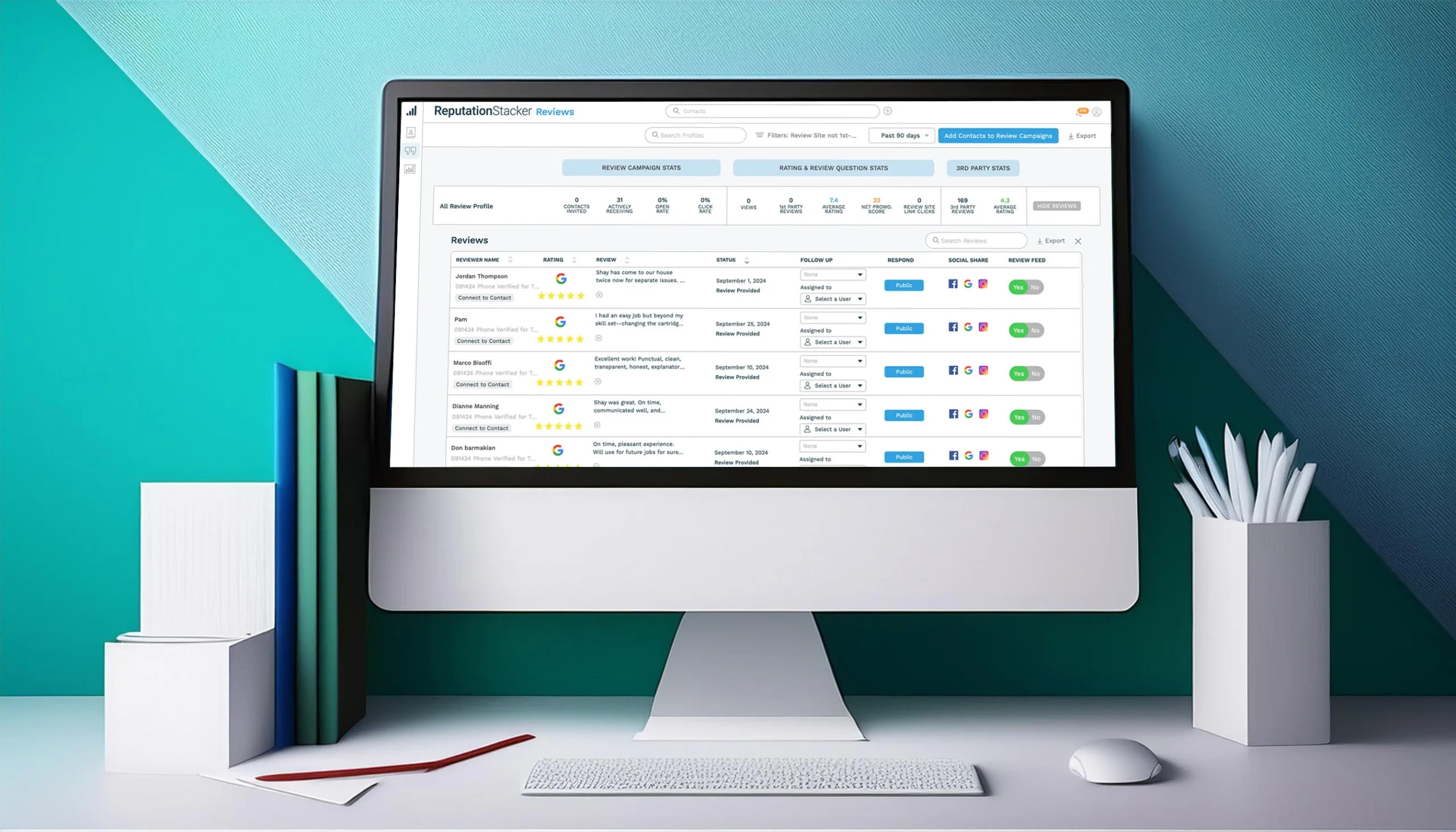Today, appearing on the first page of Google is a significant accomplishment.
Users simply interact more with businesses that rank high on search results.
Search engines have become more than just a source of information. They are also a platform people trust for credible and trustworthy information about goods and services.
As a result, businesses need to maintain a positive online presence to stay connected with their audience and attract future customers.
Despite not knowing whose words they’re reading, customers rely on each other’s reviews.
In fact, 88% of Americans trust online reviews as much as they trust personal recommendations from friends.
Additionally, 93% say they read online reviews to determine whether a business is good or bad.

For many businesses that are just building their online presence, a negative review can be a serious blow if there aren’t enough positive reviews to drown it out. And if you get a series of negative reviews without a steady stream of good reviews coming in on an ongoing basis, you’re going to have a tough time fixing your business’s online reputation.
This is where Online Reputation Management (ORM) comes into play.
ORM gives businesses the power to shape their narratives.
In today’s tech-focused world, people trust what they read online (maybe a little too much sometimes, but that’s a discussion for a different time).
While online chatter has plenty of potential downsides, this is good news for many businesses.
Once people get to talking about all the great things a company does, more customers will come running.
Read on to learn more about online reputation management and how it can help your business.
What Is Online Reputation Management?

Online reputation management (ORM) is the process of monitoring, managing, and influencing how consumers perceive your brand online.
While ORM is typically used to manage a brand’s image, it can also alter how users perceive an individual or organization.
Online reputation management involves a combination of strategies and techniques that aim to improve the online image of an entity and soften the blow of negative information.
In some scenarios, ORM can even prevent negative feedback altogether. Ultimately, ORM aims to protect and improve a business’s online reputation and increase consumer trust and credibility across the web.

To accomplish this, organizations use online reputation management tools to assist them in monitoring and tracking mentions of the brand across various online channels.
These online channels include search engines, social media, message boards, and review sites.
Information from these online channels can also help identify potential issues and address them before they have a chance to become more widespread and damaging.
Businesses can also use ORM to promote positive content about the brand, such as positive reviews and media coverage, counteract negative information, and reinforce a positive image.
ORM is becoming increasingly critical in the digital age, where the internet has become a primary source of information for many individuals.
A business’s online reputation can significantly impact its overall success, as negative information and feedback can quickly spread and damage its image.
By managing and monitoring the business’s online reputation, ORM protects and enhances a brand’s credibility and trust among its target audience.
Why Is ORM Important?

Online reputation management is vital for businesses to consider for several reasons, such as protecting their brand image, improving search engine rankings, and increasing customer trust and credibility.
Here are some of the benefits of online reputation management (ORM):
Protects brand image: ORM enables you to have more control over how your brand is perceived. Negative reviews can spread like wildfire and hurt your brand’s image, leading to a loss of credibility and trust among your target audience and customer base. ORM helps to lessen the impact of negative information by promoting a positive image of the brand.
Helps SEO: ORM can improve the ranking of your business’s website in search engine results by displaying positive information and diluting negative content. ORM can help SEO by increasing the brand’s online visibility and reaching a wider audience.
Increases customer trust and credibility: Effective online reputation management can increase trust and loyalty among customers. When prospective customers see that a brand is proactive about managing its online image and responding to any complaints or negative feedback, they are more likely to trust the brand and give them a chance.
Supports crisis management: In a crisis, ORM can help brands navigate and manage the situation by continuously monitoring the spread of negative reviews and information and taking steps to soften their impact. With ORM and proper crisis management, a business can prevent further damage to its brand’s image and reputation.
Online Reputation Management Strategy

An online reputation management strategy is a comprehensive plan that outlines the steps to monitor, maintain, and improve a brand’s online reputation.
It involves setting clear goals, identifying target audiences, and allocating resources to achieve a positive online presence.
A well-crafted online reputation management strategy should include:
Monitoring online mentions and reviews: Regularly track what is being said about your business across various platforms, including social media, review sites, and search engines. This helps you stay informed about public perception and identify potential issues early.
Responding to negative feedback and reviews: Address negative reviews promptly and professionally. Acknowledge the customer’s concerns, apologize if necessary, and offer a solution. This shows that you value customer feedback and are committed to improving their experience. Need help? Check out our guide on How to Respond to Negative Reviews.
Creating and promoting positive content: Share positive testimonials, success stories, and engaging content that highlights your brand’s strengths. This helps to counteract negative information and reinforce a positive image.
Engaging with customers on social media platforms: Actively participate in conversations on social media, respond to comments and messages, and build relationships with your audience. This fosters trust and loyalty.
Analyzing search engine results pages (SERPs) and performing search engine optimization (SEO): Ensure that positive content ranks higher in search engine results. Use SEO reputation management techniques to optimize your website, content, and review site listings, making it easier for customers to find positive information about your brand.
Managing review sites and getting more reviews: Encourage customers to leave reviews on the most important review sites for your business. This helps to build a strong online reputation and attract new customers.
By implementing an effective online reputation management strategy, businesses can protect their brand’s online reputation, build trust with customers, and drive business growth.
How Is ORM Different From SEO?

ORM and SEO are similar but distinct fields of digital marketing.
While both play a critical role in managing a business’s online reputation, they have unique objectives and focus on different aspects of a company’s online visibility.
Search engine optimization, or SEO, refers to optimizing a webpage and its content to improve its organic ranking on search engines like Google.
SEO aims to make the website visible to users all over the internet. SEO services exist to drive more organic traffic to a website by ranking higher for relevant keywords and improving the user experience on each webpage.
Online reputation management focuses on maintaining and improving a brand’s reputation and image online.
SEO focuses on content and how a website works behind the scenes, while ORM is on the front lines, constantly monitoring and managing the brand’s online presence.
Effective online reputation management (ORM) ensures that when someone searches for a specific business online, they find a positive and accurate representation of its products and services.
All this said, reviews matter to search engines.
It’s widely agreed that getting online reviews and actively responding to them are a fundamental best practice for local SEO.
Not only do reviews build trust with your users, search engines like them too. That’s right, Google reviews help SEO.
Getting a steady stream of positive reviews not only improve your business’s visibility in search results but also increase click-through rates (as searchers are more likely to choose businesses with recent positive feedback).
And when you reply to a Google review it helps SEO as well because A) It shows Google that you’re active in your Google Business Profile, and B) Your reply will naturally contain relevant keywords, which helps your business appear higher in local searches.
So while ORM and SEO are distinct fields, there is a significant amount of crossover between them.
What Does a Reputation Management Company Do?

Online reputation management companies offer a range of services designed to address both positive and negative aspects of online presence. Their primary functions include monitoring online mentions, managing reviews, and addressing negative feedback.
ORM also employ SEO techniques to ensure that favorable content ranks higher in search results, effectively pushing down negative information.
When choosing the best reputation management company for your business, it’s important to take into consideration not only their capabilities, but also their pricing.
Many businesses are often intimidated by the price of reputation management when it’s performed by a specialized reputation management consultant.
This is why many businesses, especially local businesses in need of reputation management, are turning away from professional reputation agencies and turning towards reputation management software instead.
What Does Online Reputation Management Software Do?

Online reputation management software can make the day-to-day tasks of reputation management much easier than trying to do them manually.
They can come with a variety of features, and a variety of different prices, but there are a few core functions you should look for when choosing a software to manage and improve your online reputation:
Review Gathering
Simply put, these tools will help you get more reviews. However, you must watch out for tools and services that use unethical practices like creating fake reviews and buying reviews. There are no shortcuts. If you buy reviews, you’re going to get caught and penalized by review sites. To get reviews you have to ask for reviews… and reputation management software can do it for you automatically.
Customer Feedback Solicitation
Customer feedback solicitation services will help you gather customer input that you can use to improve your business. This type of information is invaluable for identifying both the strengths and weaknesses of your business. Customer feedback software is relatively inexpensive, and it makes it easy to get customer feedback that you can put into action right away.

Review Notification
By letting you know when you get new reviews, these tools allow you to manage your time more efficiently. Instead of refreshing your review pages multiple times a day, you’ll know exactly when a review comes in. This allows you to not only stay on top of what your customers are saying about you across multiple review platforms, it also makes it easy for you to quickly respond to your reviews.
Testimonial Creation
Testimonial creation tools make it easy to display your reviews on your own website. Sharing reviews in this way is typically a much stronger form of social proof than traditional testimonials, as viewers can see the review sites that the reviews came from (versus a standard testimonial, which could be completely made up by the business owner as far as the viewer is concerned).
Social Media Management
Social media management tools enable users to schedule posts, monitor engagement, track analytics, and manage multiple accounts from a single dashboard. These tools streamline content creation and ensure consistent messaging across platforms, allowing brands to interact with their audience in real time.
While there are many of these kinds of software products available, the top choice for getting and managing reviews is ReputationStacker, and the top choices for social media management are Hootsuite and Sprout Social.
Conclusion

Online reputation management is a foundational component for any business these days.
It involves actively monitoring and influencing how a brand is perceived online through customer feedback, social media interactions, and online reviews.
Effective ORM strategies can significantly improve customer trust and drive sales.
Online reputation management software like ReputationStacker and Hootsuite can streamline this process, allowing businesses to automate review requests, track mentions across various social media platforms, and analyze customer sentiment.
By leveraging these tools, businesses can not only respond swiftly to negative feedback but also encourage positive reviews, ultimately improving their online presence.
In a world where a single review can sway potential customers, prioritizing ORM is essential for building and maintaining a strong, favorable brand image.
Frequently Asked Questions About ORM
What is Online Reputation Management (ORM)?
ORM involves monitoring and influencing how a brand is perceived. It includes managing reviews, brand mentions, and customer feedback across digital platforms to maintain a positive online reputation.
Why is having a positive online reputation important?
A positive online reputation builds trust with customers and enhances brand loyalty. It can lead to increased customer satisfaction, better search engine rankings, and ultimately, improved business performance.
How can businesses monitor brand mentions effectively?
Businesses can use online reputation monitoring tools to track mentions across social media sites and review websites. These tools collect information and provide valuable insights into customer sentiment and brand perception.
What should I do about negative online reviews?
Address negative online reviews promptly and professionally. Responding quickly shows potential customers that you value feedback and are committed to improving the customer experience. Review management software like ReputationStacker can help out with this.

How does customer feedback influence ORM?
Customer feedback is vital for shaping a brand’s reputation. Positive feedback can be leveraged as user-generated content, while negative feedback presents opportunities for improvement and demonstrates responsiveness to customer concerns.
What is the impact of social media on ORM?
Social media serves as a key platform for ORM. Brands can engage directly with customers and share positive content, thereby shaping their reputation in real-time.
Why is it important to monitor social media mentions?
Monitoring social mentions helps businesses stay informed about customer sentiment and industry trends. By tracking these conversations, businesses can respond promptly and maintain an accurate picture of their reputation.
How do I effectively manage negative comments on social media?
Responding to negative comments with empathy and professionalism is crucial. A proactive approach can turn a negative experience into a positive interaction, demonstrating commitment to customer satisfaction.

What are ORM strategies, and how do they work?
ORM strategies encompass a variety of tactics, including review management, monitoring social media conversations, and generating positive content. These strategies collectively aim to enhance brand reputation and online visibility.
How does online reputation affect customer loyalty?
A strong online reputation creates trust, which is essential for building loyalty with your customers. Satisfied customers are more likely to return and recommend your brand to others, boosting long-term success.
What is the relationship between ORM and digital marketing?
ORM is an integral part of digital marketing, as it influences how potential customers perceive a business online. Effective ORM can improve online visibility, improve marketing efforts, and drive traffic to your website.
How can I collect data on my business’s online reputation?
Utilize online reputation monitoring tools to get data about brand mentions, reviews, customer feedback, and social media interactions. This information offers valuable insights into customer sentiment and ORM effectiveness.




